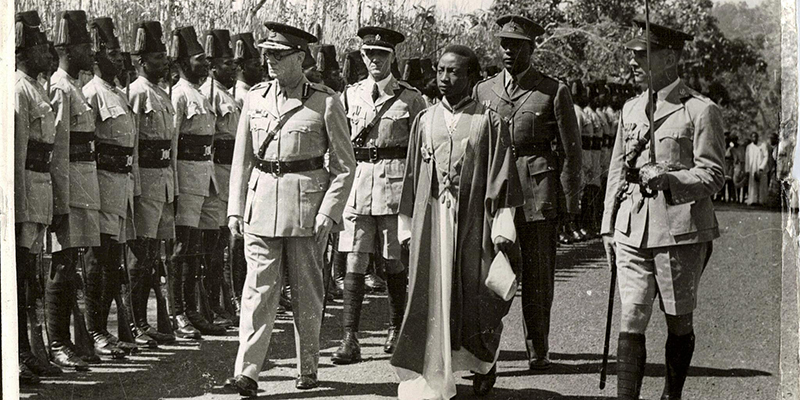human traffickingFeatures
Kiganira, the man who could blow a message to London

Sir Edward Frederick William David Walugembe Mutebi Luwangula Mutesa II of Buganda inspecting guard of honor
In 1953, Sir Edward Fredrick Luwangula Mutesa(II) of Buganda was deposed from his throne and later forced into exile in London. The British Government accused Mutesa of seeking independence for the “Province” of Buganda.
The Baganda loved and honoured their Kabaka, like they do now. They knew that life would not be the same without the man who united them.
One of Mutesa’s subjects was Kibuuka Kiganira (original name Mathias Sewanyana), the man who convinced many that he had been sent by supernatural powers to deliver Kabaka Mutesa from exile.
Excerpt from Uganda: The Rise and Fall of Idi Amin (a book compiled and edited from Drum Magazine by Adam Seftel):
“He [Kiganira] said he could blow a message to London through a hollow stick. He said he was Kibuuka, Baganda god of war. Strangely enough, many believed.
“He preached a clear and definite message which he shouted from housetops and tree tops. He said he had come to prepare the way for the Kabaka’s return.
“He even said he could send letters to the British government and the Kabaka in London by putting them in a hollow stick and blowing them through the atmosphere.
“Kiganira finally decided to preach his message from the heights of Mutundwe hill near Kampala. The hill then had few trees and its outline was clear against the sky.
“He ended up by sitting in a tree and declaiming from the lofty branches, playing the while with a snake which he coiled round and round his body. Thousands of people brought food, money and offerings to the god of the tree. They squatted on the hilltop and stayed there for several days and nights.
“No European dared to go to the top of the hill and even the Kabaka’s own police were afraid of the violence. And all the time the people gathered and things looked more and more dangerous. Finally the authorities decided to act and sent in the Kabaka’s police. In the scuffle that followed, the head of the Kabaka’s police lost his life.
“The Prosecution in Uganda’s High Court failed to find the real murderer of the Kabaka’s police chief and Kiganira was found guilty of organising an unlawful assembly where a murder was committed. He was given a 20-year sentence in 1955, after a year-long trial.”

Prince Jjuuko, Nabagereka Damali, Sir Edward Muteesa , Mr Ham Mukasa, and Princesses Ndagire
The exiling of the Kabaka, according to A History of African Christianity by Adrian Hastings, created a considerable traditionalist reaction as Kiganira, son of a catechist, claimed he was Kibuuka, Buganda’s god of war, and attracted thousands. Hastings states that sending away Mutesa actually led to a general reshuffle of religious and political forces.
In September 2009, 27 people were killed (officially) and hundreds detained as they protested a move by the Uganda government to block the current Kabaka of Buganda, Ronald Muwenda Mutebi, from visiting one of Buganda’s counties, Bugerere.
Tribe, religion, are conduits Uganda has historically relied on to bring through change. But how positive has been this change? A new conduit is necessary – one that brings Ugandans together regardless of tribe or religion – the need for dignity.
williamodinga.blogspot.com
Comments


















